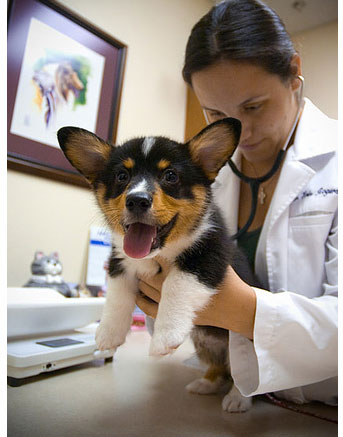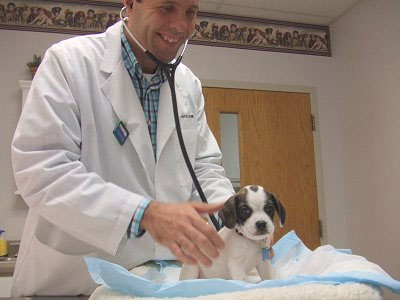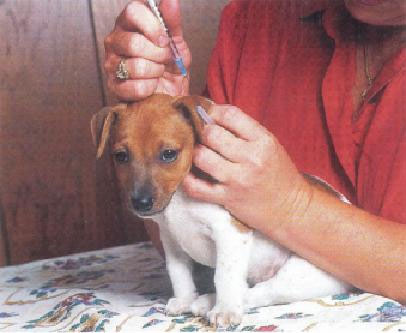Schedule of Puppy Vaccinations and Common Diseases
Caring for Puppies
Puppies are a big commitment to anyone who is willing to put up with their schnanigans and lovins'. They are not only cute and cuddley, but expensive on the pocket book, or wallet, whichever you choose.
Puppies, not only require food, a leash and collar, dog tags, food and water bowls, a crate, various chew toys, and even a dog bed, but they also require regular shots and vaccinations.
Although, not every state requires all vaccinations, it's still best to have each one. (Most states just require the rabies vaccination.) Your puppy will be healthier and safer, in the long run, as you will be preventing potentially deadly diseases.
Before you continue reading, I am not a veterinarian, vet technician, or have any experience medically working with dogs. If you have any questions or concerns, please contact your local vet.

Core Diseases
Distemper: A viral disease with a high fatality rate that primarily affects the central nervous system
Symptoms: uncoordinated walking, loss of appetite, lethargy, fever, watery discharge from the nose and eyes, seizures
Vaccine Schedule: Administered in a series of two or more injections given three or four weeks apart, starting when the puppy is 4 to 6 weeks old. Puppies must receive a booster at 16 weeks in order to develop full immunity, then another at 1 year, and then every three years thereafter.
Adenovirus-2: The cause of infectious canine hepatitis
Symptoms: stomach pain, vomiting, bloody diarrhea, jaundice, small hemorrhages on the skin and mucous membrane
Vaccine Schedule: Administered in a series of two or more injections given three or four weeks apart, starting when the puppy is 4 to 6 weeks old. Puppies must receive a booster at 16 weeks in order to develop full immunity, then another at 1 year, and then every three years thereafter.
Parvovirus: A deadly infection of the intestinal lining.
Symptoms: Severe depression, bloody diarrhea, vomiting, dehydration, fever, collapsing
Vaccine Schedule: Administered in a series of two or more injections given three or four weeks apart, starting when the puppy is 4 to 6 weeks old. Puppies must receive a booster at 16 weeks (some say 18 to 20) in order to develop full immunity, then another at 1 year, and then every three years thereafter.
Rabies: A fatal disease that attacks the nerves.
Symptoms: behavioral changes, dilated or constricted pupils, light avoidance, drooling, viciousness, facial spasms or paralysis
Vaccine Schedule: Administered as early as 3 months old. Puppies receive booster shots one year after the initial vaccine, and then as required by local or state laws, which is usually every one or three years.

Non-Core Disease (Optional Vaccines)
Leptospirosis: Bacterial infection that causes kidney and liver inflammation and organ failure
Symptoms: abdominal pain, fever, lethargy, jaundice, walking hunched, dehydration, diarrhea
Vaccine Schedule: Administer one does at 12 weeks, then a second does at 14 to 16 weeks. A booster vaccine is recommended annually.
Bordetella (kennel cough): Bacterial infection that affects the respiratory tract, including the nasal passages, windpipe, and bronchi.
Symptoms: sneezing, coughing, gagging, nasal discharge
Vaccine Schedule: Administer one does at 6 to 8 weeks, then another at 10 to 12 weeks. A booster vaccine is recommended annually.
Para-Influenza: Virus that causes respiratory respiratory disease, including kennel cough and chronic bronco-pneumonia.
Symptoms: dry cough, gagging, difficulty breathing, nose and eye discharge
Vaccine Schedule: Administer at 6 to 9 weeks, 9 to 11 weeks, and 12 to 14 weeks. A booster vaccine is recommended annually.
Lyme Disease: Bacterial infection caused by a tick bite.
Symptoms: fever, walking stiffly, swollen or painful joints in more than one limb, heart problems, possible rash
Vaccine Schedule: Initial dose at 9 or 12 weeks, and a required second dose two to four weeks later. A booster vaccination is recommended annually, just prior to the start of flea and tick season. This is usually recommended only for dogs living in areas where tick exposure is high.
Dog Natural Health Care
Dog Owner's Veterinary Handbooks

Puppy Vaccinations Wrap Up
Depending on the environment, it will benefit the puppy to receive vaccinations against upper respiratory diseases (parainfluenza and Bordatella bronchiseptica), leptospirosis, and/or Lyme disease. There is no need to vaccinate a puppy against corona-virus, which causes mild diarrhea; puppies develope their own antibodies against it naturally without becoming ill.
6 to 8 weeks
Core Vaccinations: Parvo, Distemper
Optional Vaccinations: Parainfluenza, Bordetella bronchiseptica (kennel cough)
10 to 11 weeks
Core Vaccinations: Parvo, distemper, infectious hepatitis
Optional Vaccinations: Parainfluenza, Bordetella bronchiseptica (kennel cough)
13 to 14 weeks
Core Vaccinations: Parvo, distemper, infectious hepatitis
Optional Vaccinations: Leptospirosis, Lyme
16 to 17 weeks
Core Vaccinations: Parvo, rabis
Optional Vaccinations: Leptospirosis, Lyme
1 year
Core Vaccinations: Parvo, distemper, infectious hepatitis, rabies
Optional Vaccinations: Parainfluenza, Bordetella bronchiseptica (kennel cough), Leptospirosis, Lyme
Disclaimer: Please be aware that the advice in this article should in no way replace that of a licensed veterinarian. If you have any questions or concerns, you should consult a veterinarian.
Not all veterinarians follow this exact schedule of vaccinations, as there are recent discoveries that puppies do not neccessarily need to start vaccinations until 8 weeks old unless they came from a kennel or breeder with loads of dogs. Small breeders and shelters have less chance of disease and illness from the start.










